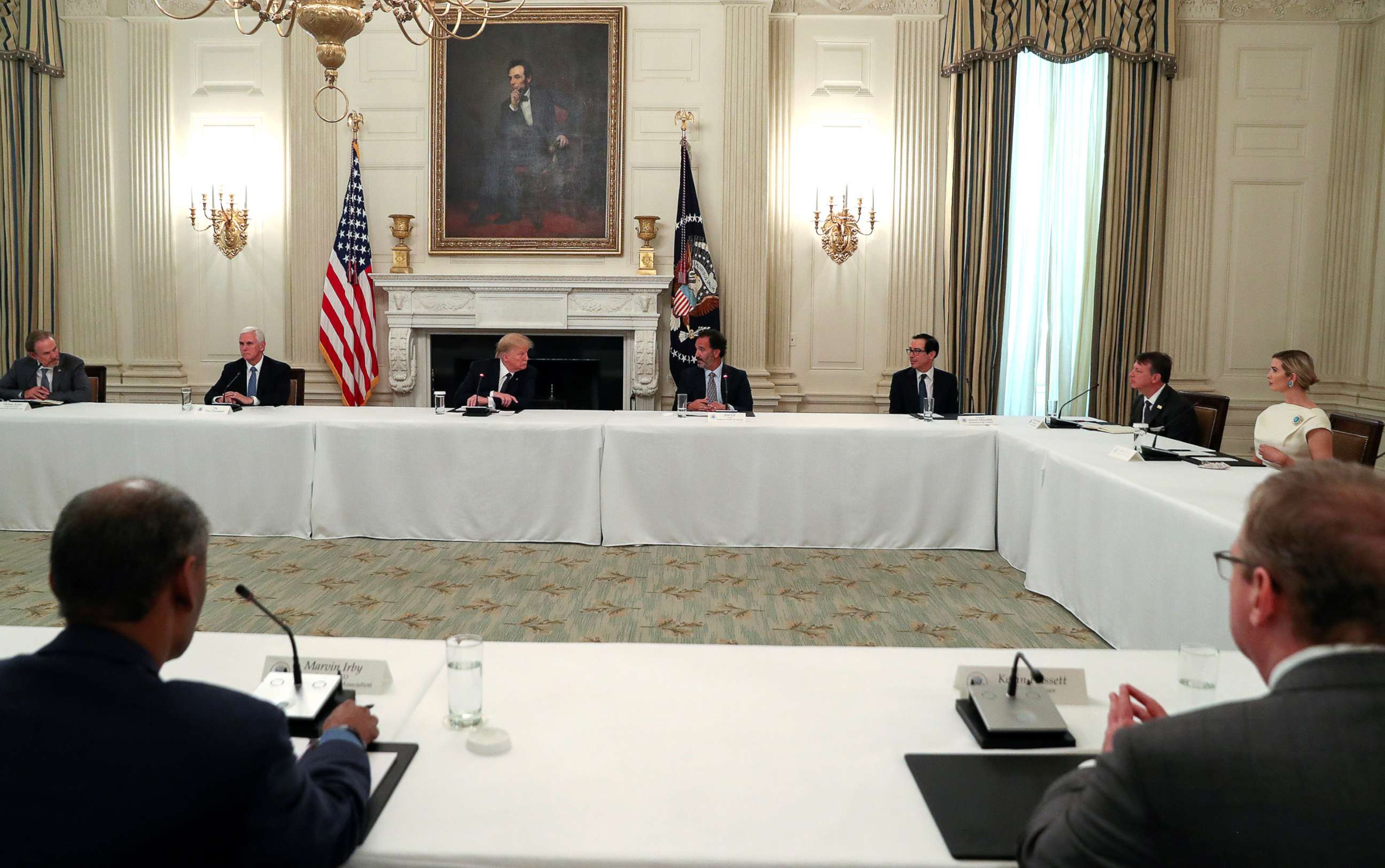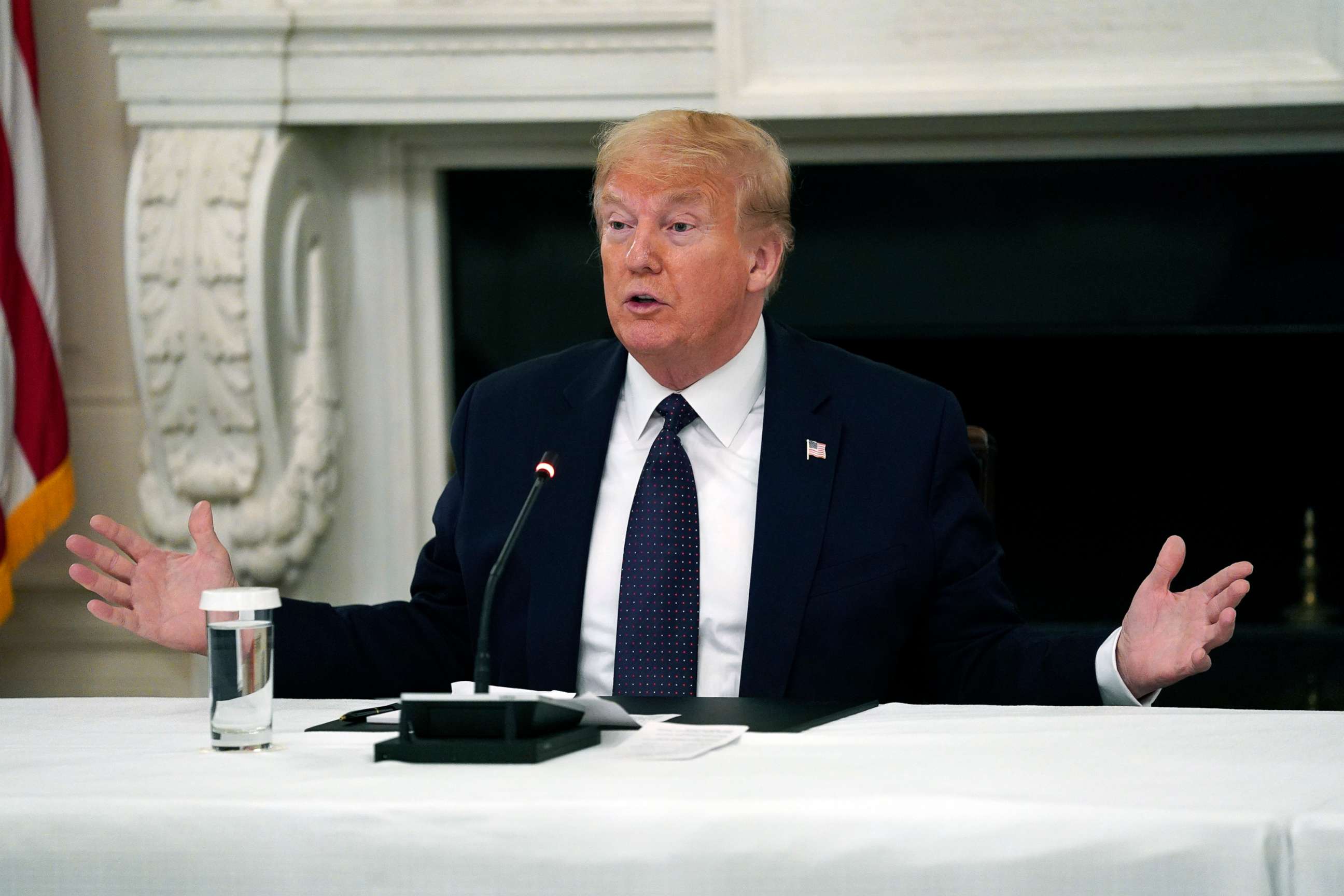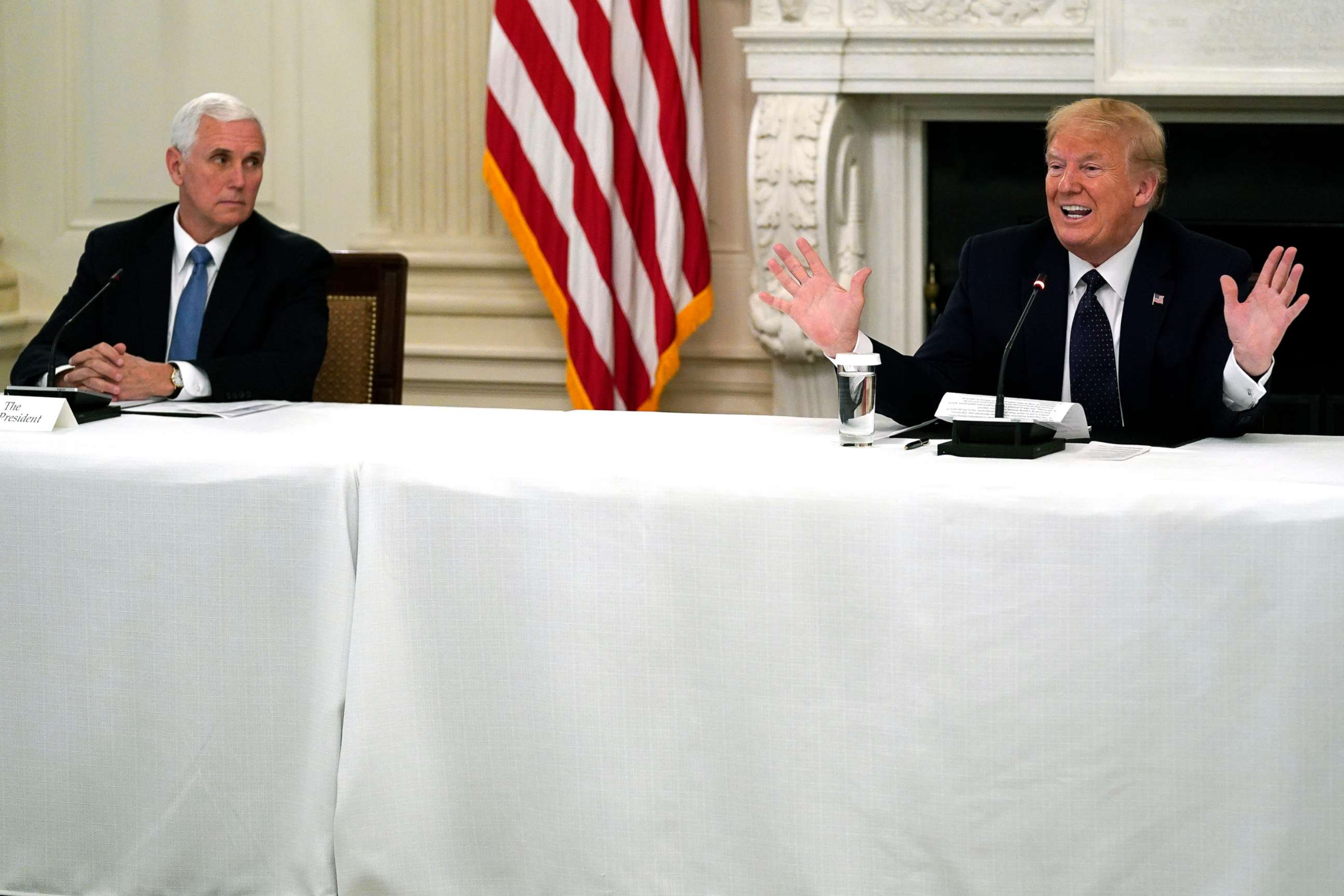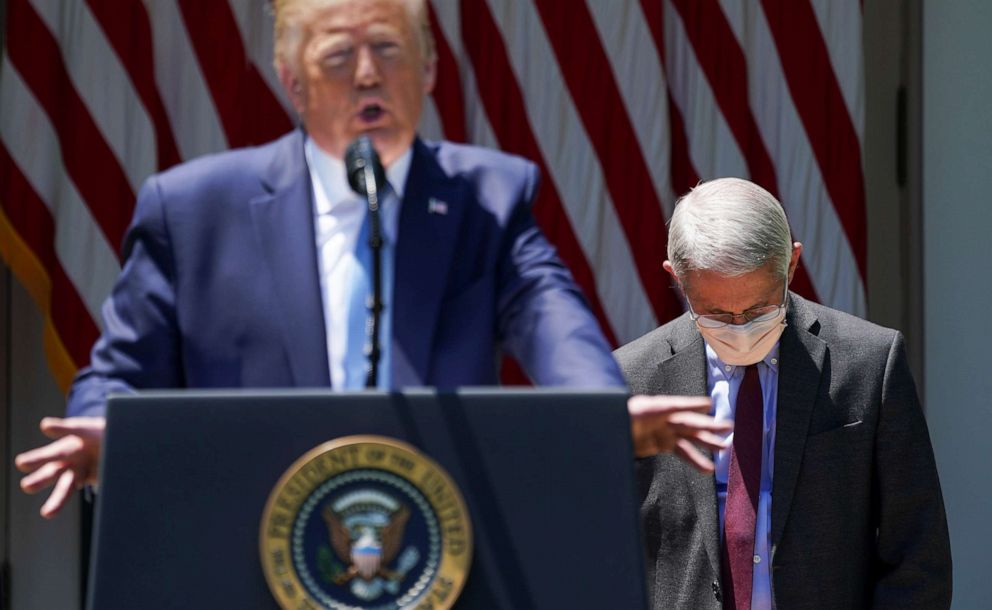Trump says he's taking hydroxychloroquine, unproven drug he's touted for COVID-19
In a surprise, he said he's been taking the drug despite having no symptoms.
President Donald Trump on Monday told reporters he's been taking hydroxychloroquine, the anti-malaria drug he's touted as a possible "game changer" treatment for COVID-19.
He said he asked the White House doctor if he could take the unproven treatment despite having no symptoms, adding he's been taking a pill a day for about a week and a half.
"I'm still fine," he said, referring to possible dangerous side effects.

The FDA last month specifically warned against taking hydroxychloroquine "outside of a hospital setting or a clinical trial due to risk of heart rhythm problems."
"I asked him, 'What do you think?' He said, 'Well if you'd like it.'" I said. 'Yeah I'd like it. I'd like to take it. 'Yeah I'd like it. I'd like to take it," Trump claimed. "So, I'm taking the zinc and the hydroxy. And all I can tell you is, so far I seem to be okay."
The president said he's received "a lot of positive letters" offering good feedback of hydroxychloroquine and insisted even if it's not effective, he claimed, "You're not going to get sick or die."
Tune into ABC at 1 p.m. ET and ABC News Live at 4 p.m. ET every weekday for special coverage of the novel coronavirus with the full ABC News team, including the latest news, context and analysis.

"And it seems to have an impact -- and maybe it does, maybe it doesn't -- but if it doesn't, you're not going to get sick or die. This is a, a pill that's been used for a long time for 30, 40 years on the malaria and or lupus to, and even on arthritis I guess from what I understand, so it's been heavily tested ..." the president said.
"What do you have to lose?" he added, describing the drug as a "preventative" measure.
When surprised reporters asked if he were taking it because he's exhibited symptoms, the president replied, "Zero symptoms."
Trump told them that he was "just waiting to see your eyes light up when I said this," adding, "and I'm still here. I'm still here to explain to you."
"I take a pill every day. At some point, I'll stop. What I'd like to do is I'd like to have the cure and/or the vaccine. And that will happen, I think, very soon," he added.

While the FDA has warned of serious side effects of the drug currently unapproved to treat COVID-19, Trump has for weeks touted the promise of the drug as a potential "game changer," often at odds with his own public health officials.
"I actually haven't heard a bad story to tell you the truth. I haven't heard a bad story, so it's pretty amazing actually," Trump has said promoting the its use for patients with serious cases of the virus during a meeting with recovered coronavirus patients last month.
A panel of doctors and other experts convened by the National Institutes of Health in April recommended against using hydroxychloroquine and azithromycin together to treat COVID-19, unless they were being used as part of a clinical trial.
The Infectious Diseases Society of America also recommends against giving patients combinations of hydroxycloroquine, the similar drug chloroquine, or azithromycin unless enrolled in a clinical trial.
Trump has repeatedly suggested that people combine the two drugs, both in briefings at the White House and on Twitter.
While the president has persisted in his promotion of the promise of hydroxychloroquine by highlighting anecdotal stories of success when the drug has been used, the nation's top infectious disease expert Dr. Anthony Fauci has said there is no scientific evidence to support an endorsement of the drug.
"The answer is no," Fauci told a reporter bluntly last month, while standing beside the president, when questioned about the drug's potential promise.
"The information that you're referring to specifically is anecdotal," Fauci told the reporter. "It was not done in a controlled clinical trial. So you really can't make any definitive statement about it."
Earlier in April, the president even appeared to block Fauci from further contradicting him when a reporter sought to ask Fauci again whether there is any evidence of the drug's success, in light of the president's continued promotion of the drug.
"Do you know how many times he's answered that question? Maybe 15," Trump interjected before Fauci, who was standing at the podium, could answer the reporter's question.

"If it doesn't work, it's nothing lost by doing it. Nothing," Trump said that day in promoting the application of the drug as low-risk, a point he repeated to reporters Monday.
Asked what evidence he has that it has a preventative effect, the president said: "Here we go. Are you ready? Here's my evidence. I get a lot of positive calls about it."
"I want the people of this nation to feel good. I don't want them being sick. And there is a very good chance that this has an impact, especially early on. But you look at front-line workers. You look at doctors and nurses. A lot of them are taking it as a preventative," the president continued. "What do you have to lose?"
Notably, though the FDA warns against its use outside of a hospital setting, the agency is allowing frontline workers to use hydroxychloroquine as part of controlled, clinical trials.
Dr. William W. O'Neill, leading one of the largest studies of the drug's use as a potential preventative medication, has said safe studies are necessary to determine the medication's potential.
The randomized, double-blinded study he's overseeing is a 3,000-subject look at Henry Ford Hospital in Detroit at whether hydroxychloroquine prevents front-line workers from contracting the COVID-19 virus.
"We are not involved in politics; we are scientists," Dr. O'Neill, a world-renowned interventional cardiologist and researcher, said on May 8.
"This is a drug that has been used safely for more than 70 years to prevent malaria and treat other issues like lupus, with the potential to have active effect on COVID-19," O'Neill said, a sentiment Trump echoed Monday at his surprise announcement. "We owe it to people -- particularly front-line workers -- to scientifically determine if it works."
O'Neill also said that whether it works, "having those results produced in a scientific manner moves us toward the goal of knowing how to protect our frontline workers."
Other countries including Spain and Brazil have also launched large scale studies for front-line workers testing hydroxychloroquine's effectiveness in preventing the virus.
Currently, there are no FDA-approved preventative medications or vaccines for COVID-19.
ABC News' Anne Flaherty contributed to this report.
This report was featured in the Tuesday, May 19, 2020, episode of "Start Here," ABC News' daily news podcast.
"Start Here" offers a straightforward look at the day's top stories in 20 minutes. Listen for free every weekday on Apple Podcasts, Google Podcasts, Spotify, the ABC News app or wherever you get your podcasts.
What to know about the coronavirus:
- How it started and how to protect yourself: Coronavirus explained
- What to do if you have symptoms: Coronavirus symptoms
- Tracking the spread in the U.S. and worldwide: Coronavirus map



